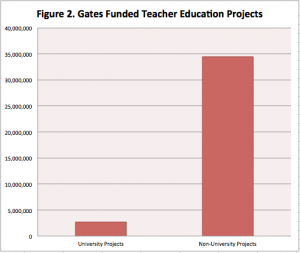The Art of Teaching Science: What Sort of Teacher Preparation Programs Does the Gates Foundation Support?
Did you know that between 2008 and 2013, The Bill and Melinda Gates Foundation provided more than $37 million in funding for teacher preparation projects?
What sort of teacher preparation programs does the Gates Foundation support?
Only 8% of these funds were awarded to university teacher education programs. Ninety-two percent of the grant money was awarded to corporations including The New Teacher Project (TNTP) and Teach for America (TFA). Michelle Rhee, a former Teach for America cadet, and former Chancellor of the D.C. schools founded and ran The New Teacher Project. Teach for America was founded by Wendy Kopp in 1989. Rhee has two years of teaching experience, while Kopp has no teaching experience.
So, organizations whose heads have very little practical teaching experience are likely to receive funding from the Gates Foundation, while universities with qualified and experienced educators are not likely to receive much in funding.
As you see in Figure 1, ten institutions received funding for teacher preparation from Gates. Only four are universities. There were 20 funded grants, most of them going to two organizations, TFA and TNTP. In each of these programs, teachers are trained during a 5-week summer term, and then assigned to a school somewhere in the country. Under these circumstances, school districts have a pipeline of new, but uncertified and inexperienced teachers to hire, often in challenging teaching environments.
The university grants are very small in comparison to the TFA and TNTP. The largest of the university grants was awarded to the University of Central Florida to support its TeachLivE program, a simulation for teacher development. According to the TeachLivE website, “it provides pre-service and in-service teachers the opportunity to learn new skills and to craft their practice without placing “real” students at risk during the learning process.”
This graph is based on data from the Gates Foundation that appeared in the Education Week article, “Follow
the Money: Gates Giving for Its Teacher Agenda“, November 5, 2013.
The Gates Foundation, which is the largest private foundation on Earth, believes that teachers can be trained in a summer camp type of environment, and immediately be placed in schools to teach. Because many of the persons that are recruited by programs such as Teach for America sign up for only two years, in the long run, this approach to teacher preparation is not sustainable. Suggesting that uncertified and in the long run, part-time teachers is a way to staff schools with effective teachers is unfortunate.
 Teacher education makes a difference in the quality and effectiveness of professional teachers. Clinically based, and constructivist oriented teacher education program are more effective than a summer program in which pedagogy is crammed into a five-week program. I know this first-hand because I was involved in two summer teacher education programs at Georgia State University from 1987 – 1992 (The Alternative Certification Program and the AFT Educational Research and Dissemination Program-TRIPS) Although our programs involved mentor teachers, who also received training, the programs did not compare in effectiveness to the program that emerged from our experiences. Out of our experiences in these two programs, we developed the TEEMS program, a master’s level, full-time, clinically based program for mathematics and science teachers.
Teacher education makes a difference in the quality and effectiveness of professional teachers. Clinically based, and constructivist oriented teacher education program are more effective than a summer program in which pedagogy is crammed into a five-week program. I know this first-hand because I was involved in two summer teacher education programs at Georgia State University from 1987 – 1992 (The Alternative Certification Program and the AFT Educational Research and Dissemination Program-TRIPS) Although our programs involved mentor teachers, who also received training, the programs did not compare in effectiveness to the program that emerged from our experiences. Out of our experiences in these two programs, we developed the TEEMS program, a master’s level, full-time, clinically based program for mathematics and science teachers.
In a Journal of Teacher Education article entitled How Teacher Education Matters, Linda Darling-Hammond reviewed the literature on teacher education programs and has this to say:
Despite longstanding criticisms of teacher education, the weight of substantial evidence indicates that teachers who have had more preparation for teaching are more confident and successful with students than those who have had little or none. Recent evidence also indicates that reforms of teacher education creating more tightly integrated programs with extended clinical preparationinterwoven with coursework on learning and teaching produce teachers who are both more effective and more likely to enter and stay in teaching. An important contribution of teacher education is its development of teachers’abilities to examine teaching from the perspective of learners who bring diverse experiences and frames of reference to the classroom.
Post Script
In teacher preparation there are various pathways to becoming a teacher, including teacher education programs, alternative programs, or no program. Based on a large study of 3000 beginning teachers in New York City regarding their views on their preparation for teaching, their beliefs and practice, and their plans to remain in teaching (Darling-Hammond, Chung, and Frelow), the researchers found that:
- teachers who were prepared in teacher education programs felt significantly better prepared across most dimensions of teaching than those who entered teaching through alternative programs or without preparation.
- the extent to which teachers felt well prepared when they entered teaching was significantly correlated with their sense of teaching efficacy, their sense of responsibility for student learning, and their plans to remain in teaching.
- These are significant finding in the context of the drive to place non-certified and non-prepared teachers into classrooms that typically are more demanding and require more knowledge about learning and student development than these individuals can deliver. The knowledge base on teaching is enormous, and to think that we can prepare teachers in 5 – 8 week institutes only devalues what we know about preparing teachers for practice.
What do you think about effort of the Gates Foundation to influence the way teachers are prepared?
This blog post has been shared by permission from the author.
Readers wishing to comment on the content are encouraged to do so via the link to the original post.
Find the original post here:
The views expressed by the blogger are not necessarily those of NEPC.

